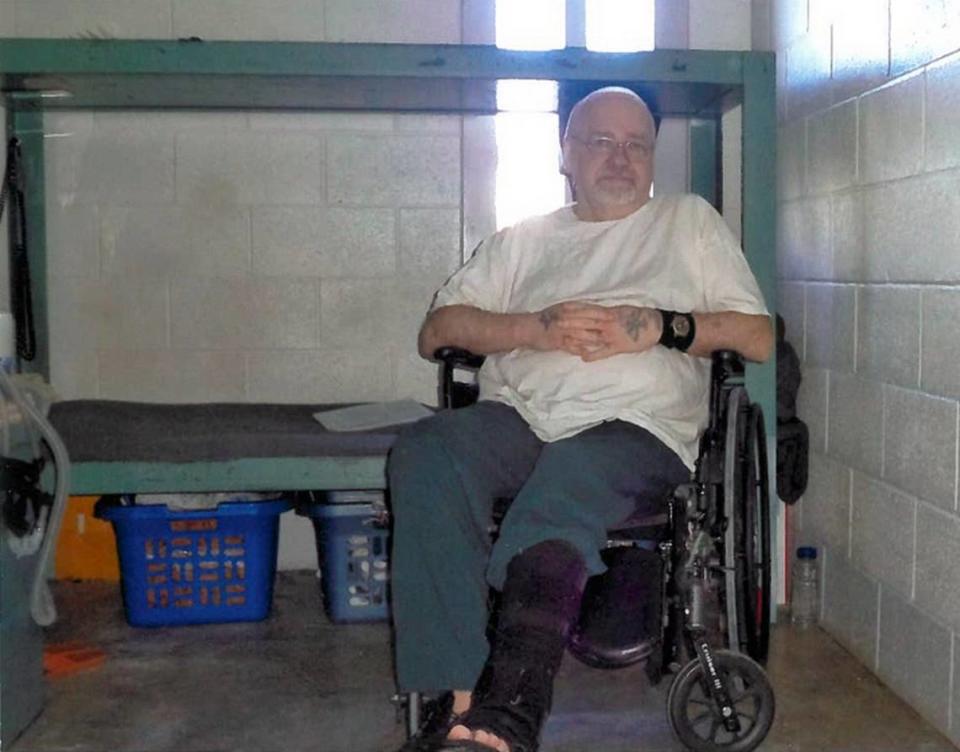Idaho found lethal injection drugs for an execution. Here’s how much they cost taxpayers
The price of drugs that Idaho needs to execute a death row inmate has tripled since the last time the state carried out a lethal injection more than a decade ago.
The Idaho Department of Correction paid $50,000 for 15 grams of pentobarbital, according to a purchase order for the execution drugs obtained by the Idaho Statesman through a public records request. The document’s release also is the first time state prison officials have revealed which drug they acquired for the planned execution of Thomas Creech, Idaho’s longest-serving death row inmate.
“Upon payment, vendor agrees to maintain and store the items in accordance with all applicable regulations until IDOC takes possession of the items,” the document read. “Vendor agrees to refund IDOC an amount up to $50,000 if it fails to provide to IDOC the purchased items, in whole or in part.”
IDOC last month disclosed that prison officials had secured lethal injection drugs for the first time in years when they also announced a death warrant for the 73-year-old Creech, a convicted quadruple-murderer.
Prison officials declined to tell the Statesman whether they have the pentobarbital on hand. Creech’s execution has since been postponed.

According to the state prison system’s execution procedures, officials use 5 grams of pentobarbital to lethally inject a prisoner in the one-drug protocol. In case they are needed, two backup sets of syringes also are prepared for a lethal injection, each with 5 grams of pentobarbital.
IDOC Director Josh Tewalt did not respond Thursday to a Statesman interview request through a department spokesperson about Idaho’s execution process. Tewalt, appointed to the post in December 2018, has not made himself available for similar interview requests from the Statesman concerning executions for more than two years.
In a phone interview with the Idaho Capital Sun earlier this month, Tewalt said IDOC won’t force the issue as Creech’s legal process plays out. The Idaho Commission of Pardons and Parole agreed to grant Creech a hearing in January to review whether to recommend reducing his death sentence to life in prison.
“We will not move forward unless we can do it in a way that is dignified,” Tewalt said. “We are committed to carrying it out with integrity, dignity and respect for everyone involved.”
Unable to get drugs, IDOC delayed execution
The prison system’s ability to purchase execution drugs came as a bit of a surprise.
Prisons in the states across the U.S. that maintain active capital punishment have increasingly struggled to buy the drugs used to perform lethal injections. Prison officials have said manufacturers and other suppliers won’t sell them drugs like pentobarbital, a potent sedative that can stop a person’s breathing in higher doses, out of fear of being identified, leading to public backlash for assisting with an execution — a hotly contested national issue.
Unable to locate execution drugs despite past efforts, Idaho last year passed a shield law that prevents the release of certain records to the public to protect the identity of potential drug suppliers. Proponents said the goal of the law is to conceal the suppliers’ information to encourage them to sell the drugs to the state.
Prison officials still found themselves without the ability to acquire the drugs necessary for a lethal injection. Late last year, IDOC was forced to postpone the execution of another death row inmate after the agency could not purchase them. The occurrence led state lawmakers earlier this year to pass another law that establishes a firing squad as the backup execution method when lethal injection drugs are unavailable.
In a legal filing in March, state officials again acknowledged the prison system still had not been able obtain the lethal drugs. And as recently as Oct. 10 — two days before Creech was served a death warrant — state officials once more affirmed in a legal filing that Idaho’s prison system “does not have the present ability to carry out an execution via lethal injection or firing squad” while the shooting facility remains in development.
As a result of the shield law, it’s unclear where prison officials found the drugs intended for Creech’s execution. Also redacted from the execution drug order was the purchase date.
IDOC officials cited several public records exemptions related to executions for redacting the purchase date, including those covered in the shield law. The agency failed to provide the responsive records within a maximum of 10 business days, as required by the Idaho Public Records Act. Instead, IDOC staff took more than double that amount of time, at 23 business days.
In its eventual response, IDOC raised concerns that release of the information may jeopardize the state’s ability to carry out an execution.

The redaction made former state Rep. Greg Chaney, a Caldwell-based attorney who sponsored the shield law, wonder about IDOC’s rationale. The law appears to have worked as intended, he said, in that it helped IDOC obtain lethal injection drugs, but concealing the purchase date left him with questions.
“Exceptions to government transparency should be as narrow as possible,” Chaney said in a statement to the Statesman. “I’d be interested to know how its disclosure would lead to the identity of the supplier. If there isn’t a way that the withheld information could lead to the disclosure of the supplier, then it goes beyond the spirit of the legislation.”
Questions over use of compounding pharmacies
For Idaho’s most recent executions, prison officials resorted to covert tactics to conceal information from the public about where they bought execution drugs, and how much they paid, the Statesman previously reported. In the middle of a yearslong legal battle over public records, which IDOC lost in 2021 and finally forced release of documents disclosing the information, the agency further tightened its rules around records exemptions for documents related to executions.
The records revealed that IDOC used confidential cash accounts to hide the execution drug purchases from two out-of-state compounding pharmacies with questionable safety records. Compounding pharmacies are custom drug producers that are less regulated because they’re not closely monitored by the U.S. Food and Drug Administration.
In 2012, state prison officials paid as much as $15,000 in cash for pentobarbital, according to public records and past court depositions. The drugs, bought from the Union Avenue Compounding Pharmacy in Tacoma, Washington, were used in the lethal injection execution of convicted murderer Richard Leavitt in June 2012.
The year prior, prison officials paid as much as $10,000 in cash to the University Compounding Pharmacy in Salt Lake City for pentobarbital, according to a sworn deposition by another of IDOC’s former deputy prison chiefs, The Salt Lake Tribune reported. Those drugs were used to execute Paul Rhoades, a convicted triple-murderer, in November 2011.
Because of Idaho’s new shield law, the public is no longer entitled to know whether prison officials again purchased pentobarbital from a compounding pharmacy, rather than from a commercial drug manufacturer. The difference between the two versions is considerable, with potentially significant consequences for the expiration of a drug like pentobarbital, said Dr. Jim Ruble, an attorney and longtime doctor of pharmacy who teaches law and ethics courses at the University of Utah’s College of Pharmacy.
Compounded pentobarbital reaches its “beyond use date” as far out as 45 days, but as early as two days, based on several factors, including the conditions in which it’s stored, Ruble told the Statesman by phone. However, a manufactured version — like that sold to hospitals — doesn’t expire for up to four years, he said.
“Therein is the challenge with the transparency in all of this,” Ruble said. “We don’t have readily available to us the recipe, so to speak, or the formulation that is being utilized by compounding pharmacies, so we have to take it to some degree on faith or face value.
When either version reaches its shelf life, it begins to lose potency and essentially becomes toxic, he said. Visible crystallized particles begin to form in the liquid pentobarbital solution, which, if injected, can cause “undue suffering” from “excessive levels of pain,” Ruble told the Statesman. If injected particles are large enough, they can cause internal bleeding in tissues, the lungs or other organs.

Such treatment, including during the lethal injection of a prisoner, could be grounds for a legal challenge that the use of potentially expired execution drugs violates an inmate’s rights against cruel and unusual punishment guaranteed under the Eighth Amendment of the U.S. Constitution.
In a statement after IDOC announced Creech’s death warrant, his attorneys at the nonprofit Federal Defender Services of Idaho said they’d be exploring just that very kind of litigation.
“Given the shady pharmacies that the state has obtained the lethal drugs from for the past two Idaho executions, … we remain highly concerned about the measures the state resorted to this time to find a drug supplier,” Deborah A. Czuba, supervising attorney of the legal nonprofit’s unit that oversees death penalty cases, said in a statement. “We will be doing everything we can to fight for Mr. Creech’s life, including challenging the quality of the drugs and execution by lethal injection.”
IDOC disputes parking lot purchase
Attorneys at the Federal Defender Services of Idaho alleged in a prior case representing Gerald Pizzuto, another death row inmate, that Tewalt, then a deputy chief of prisons, was among two Idaho prison officials who bought the execution drugs in Tacoma in an evening exchange in a Walmart parking lot. The compounding pharmacy in Tacoma is located across the street from the city’s only Walmart.

Flight records, previously obtained by the Statesman from the Idaho Division of Aeronautics through a public records request, place Tewalt and then-IDOC prisons chief Kevin Kempf on a state-chartered flight back and forth from Tacoma in May 2012 at an estimated cost of about $2,500. The Tacoma pharmacist acknowledged in a December 2021 statement to the Statesman the in-person delivery of pentobarbital to members of IDOC in May 2012.
In a statement to the Capital Sun since shared with the Statesman, IDOC officials denied the account of how they acquired the drugs. The agency called the legal nonprofit’s accusation that they bought the drugs in a parking lot “absurd and false,” in anticipation of additional media coverage tied to Creech’s scheduled execution.
“Some of it will surely include a repetition of certain absurd and false allegations that were intended to shock and mislead, like the allegation that the chemicals used in prior executions were bought in a Walmart parking lot,” read the statement from Jeff Ray, IDOC’s spokesperson. “Department officials deny that allegation. The chemicals were procured in accordance with state and federal laws.”

